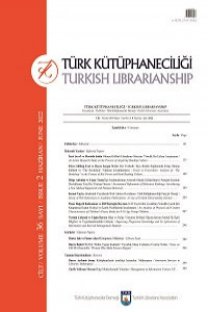Whither Nordic Public Libraries? Towards a Cross-Country Research Initiative on the Historical Heritage, Role Self-perception, and Challenges of Public Libraries in Denmark, Finland, Norway and Sweden
Whither Nordic Public Libraries? Towards a Cross-Country Research Initiative on the Historical Heritage, Role Self-perception, and Challenges of Public Libraries in Denmark, Finland, Norway and Sweden
In these years, the role and mission of the mainstream Western world public library are increasingly being questioned and challenged. Current discussion as it has unfolded during the last few years within the public library community, and among educators and researchers in the field, more and more point to the fact that public libraries are facing a need for reorientation and reconsideration of their role along with the services they provide to their users. Public library use, primarily the number of library loans, seems to be shrinking, but the function of the library as an informal meeting place and a social space in the local community seems to attract an increasing amount of interest professionally and academically. As a by-product of this interest, various scenarios for the development of the public library have been presented. The nature of challenges confronting public libraries - including those emerging from the web, from the dispersion of social software and changes in users' habits, tastes, preferences, etc. - are examined. Moreover, commoditisation of human life, a manifest phenomenon in the age of late modernity, has gradually led to a shift in emphasis from enlightenment to a short-term and customer-centred perspective. The discussion of emerging identities and roles for the public library can be seen as the starting point for a joint research initiative initiated by Library & Information Science (LIS) schools in the Nordic countries. Detailed treatment is given to the efforts to get this research initiative, which aims to reflect strategically on the role of the public library in democracy and welfare state in Scandinavia, off the ground. In defi ning the contents and direction of the research initiative, a public library researchers' seminar was held in Uppsala, Sweden in May 2007. Finally, some critical observations are presented on the way in which current professional policy- making, LIS scholarship and theory building as developed in the United Kingdom and North America seems to impact on - and to some extent ignore - developments in public library communities outside the English-speaking countries.
___
- Andersen, J. and Skouvig, L. (2006). Knowledge Organization: A sociohistorical Analysis and Critique. The Library Quarterly, 76 (3): 300-323. Audunson, R. (2006). "The Public Libraries' Potential in in Promoting Social Capital and Community Involvement in a Digital and Multicultural Context," in Herbert K. Achleitner and Alexander Dimchev, eds., Globalization, Digitization, Access and Preservation of Cultural Heritage. Papers from the International Conference, Sofia, Bulgaria, 8-10 November 2006 2007(pp. 411-422). Sofia: "St.Kliment Ohridski" University of Sofia.
- Holmgaard Larsen, J. and Wigell-Ryynänen, B. and others, (eds.). (2006). Nordic Public Libraries in the Knowledge Society. Copenhagen: Danish National Library Authority. http://www.bs.dk/publikationer/english/nnpl/ index.htm (accessed June 15, 2007).
- Hvenegaard R., Casper and Jochumsen, H. (2007). Problems and Possibilities: The Public Library in the Borderline between Modernity and Late Modernity. The Library Quarterly, (77) (1): 45-59.
- Kajberg, L. and Johannsen, C. G. (eds.). (2005). New Frontiers in Public Library Research. Lanham, Md.: Scarecrow.
- Qvortrup, L. (2006). Folkebiblioteket under forvandling. Information 11 April 2007. Strategi: Fra information til viden. På vej til vidensamfundets bibliotek. Copenhagen: Danish National Library Authority.
- Yayın Aralığı: 4
- Başlangıç: 1952
- Yayıncı: Türk Kütüphaneciler Derneği
